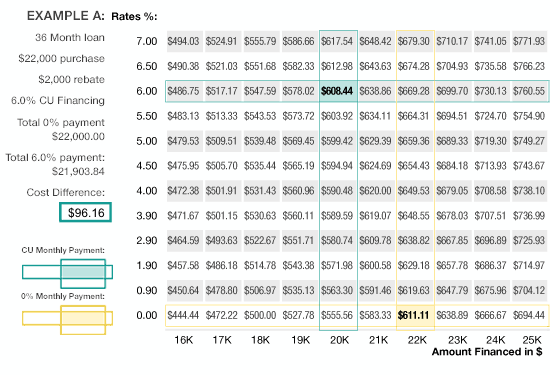The assignee has a lien on the vehicle and can repossess if you don't pay. Co-signer A co-signer is a personsuch as a parent, close family member, or friendwho promises to pay back the loan if you do not. This can be a benefit both to you and your lending institution. A co-signer takes complete responsibility to pay back the loan. Having a co-signer on your loan offers your lending institution additional assurance that the loan will be paid back. If you do not repay your loan, your co-signer will be accountable for payment even if the co-signer never ever drove your lorry. If you've been asked to co-sign a loan, you ought to think about how it will impact your financial resources. In some states, the law permits the financial institution to reclaim http://jaidenpqac326.lowescouponn.com/things-about-lease-or-finance-a-car-which-is-better your car without litigating. For more details, including meanings of common terms used when financing or leasing a cars and truck, read "Comprehending Car Funding," collectively prepared by the American Financial Solutions Association Education Foundation, the National Vehicle Dealers Association, and the FTC. To buy print copies of "Understanding Car Funding," call the AFSA Education Foundation: (888) 400-7577.
A finance charge is a cost troubled a consumer for obtaining credit. Finance charges include interest on debt balances and any extra charges imposed by the credit-issuing entity. Listed below, you'll discover typical examples of financing charges that consumers face, and some suggestions for minimizing the effect of these charges. A financing charge is any cost a customer encounters in the procedure of getting credit and repaying debt. Finance charges generally featured any kind of credit, whether it's a charge card, a service loan, or a mortgage. Any amount you pay beyond the amount you obtained is a finance charge.

Among the advantages of having a charge card is that you can obtain cash without having to pay off your balance completely each month. Nevertheless, taking your time to repay your financial obligation comes at a rate. Your issuer will charge interest on any balance not paid off by the end of the month. That interest expense is a finance charge. how to give back a timeshare If you miss out on a minimum payment deadline that falls outside of a grace period for your credit card, you might be charged a late payment charge, which is another example of a finance charge. Funding financial obligation is huge business in the U.S.
3 trillion. That's a 1. 1% boost given that the 4th quarter of 2019, when home debt was currently 26. 8% greater than it was in 2013. Most of that debt (if not all of it) will feature finance charges such as interest charges and loan processing charges. Financing charges are determined each billing cycle based upon the existing prime rate. Since July 15, 2020, the Wall Street Journal determined the prime rate to be 3. 25%. This rate varies in response to market conditions and Federal Reserve policy, so your capacity finance charge might vary monthly (How many years can you finance a boat). If you have a fixed-rate loan, the finance charge is less likely to vary, though it might still change based on elements such as your payment history and timeliness.
Not known Factual Statements About How To Use Quickbooks For Personal Finance
Charge card issuers may calculate financing charges utilizing your everyday balance, approximately your day-to-day balance, the balance at the beginning or end of the month, or your balance after payments have been applied. Your credit card agreement may also include a minimum financing charge that's applied anytime your balance goes through a fee. For example, your charge card terms may consist of a $1 minimum finance charge, so if a billing cycle's charges are $0. 65, that'll be assembled to $1. You can decrease the quantity of interest you pay by minimizing your balance, asking for a lower interest rate, or moving your balance to a credit card with a lower rates of interest.
Finance charges can be listed in a number of put on your monthly credit card billing declaration. On the first page of your billing statement, you'll see an account summary noting your balance, payments, credits, purchases, and any interest charges. In the breakout of deals made on your account during the billing cycle, you'll see a line product for your financing charge and the date the finance charge was assessed. In a different section that breaks down your interest charges, you'll see a list of your financing charges by the kind of balances you're carrying. For example, if you have a purchase balance and a transfer balance, you'll see information of the finance charges for each.
For home mortgages, month-to-month payments are separated into primary and interest payments, in addition to extra expenses like real estate tax. In this case, the "principal" part of payments wouldn't certify as a finance chargeit simply approaches lowering your debt balance. The interest payments, on the other hand, are a financing charge. Making your minimum charge card payment is generally sufficient to cover your finance charge plus a little percentage of the balance. Nevertheless, if you're just paying the minimum payment, your balance won't decrease by that muchit takes the bulk of Click here for info a monthly payment simply to cover interest charges. Since your balance isn't decreasing considerably, you'll deal with another interest charge throughout the next billing cycle.
For those with substantial debt, the minimum payment might not cover the month's financing charge. In this case, paying the minimum will result in a larger balance. Decreasing financial obligation will need payments beyond the minimum. A finance charge is a cost imposed on a customer who gets credit. Financing charges consist of interest charges, late charges, loan processing charges, or any other expense that exceeds paying back the quantity obtained. For many kinds of credit, the financing charge fluctuates as market conditions and prime rates change.
